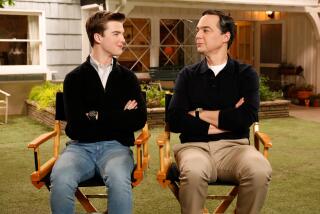TV REVIEW : ‘Cosby’: A Classy Farewell : Hour Finale Ends Run of Beloved Series
- Share via
Cliff Huxtable is incredulous. “It’s over?” he asks tonight when the long-awaited but brief college graduation ceremony involving his son, Theo, ends abruptly. “There is nothing else?”
Only the reruns, as NBC’s epic comedy series, “The Cosby Show,” ends its 7 1/2-year sprint with a special hour episode (at 8 p.m. on Channels 4, 36 and 39) that is funny, happy, celebratory and just a little bit sad without being schmaltzy or manipulative. It’s a classy way to say goodby.
And NBC--by constantly touting tonight’s last episode, even on some of its news programs--has done its best to ensure it an enormous audience against a counterprogrammed double-rerun hour of “The Simpsons” on Fox.
Although still melodious after all these years, “The Cosby Show” hung on after the fat lady sang, according to the mugging, rubbery-faced comedian who co-created and was deeply involved in virtually every aspect of the series. “I think we went a year too long,” Bill Cosby told Jane Pauley on “Dateline NBC” Tuesday night. “I ran out of everything I wanted to say with the Huxtables.”
Except farewell.
In focusing on Theo’s graduation from New York University, “The Cosby Show” finale knots loose ends left dangling since its Sept. 20, 1984, premiere, when Cliff entered Theo’s clothes-strewn, teen-ravaged room to dispense fatherly anger to his happy-go-lucky son. Theo had irked his parents by bringing home yet another “D”-tainted report card.
“No problem,” chirped Theo, adding that, unlike his physician father and attorney mother, he planned to be a “regular person” and “work in a gas station, drive a bus, something like that.”
Cliff would have none of it, of course, giving Theo a lesson in upper-middle-class economics with Monopoly money and commanding him to do better. Tonight, former underachiever Theo thrills his parents by finally passing “Go.”
It’s that early bedroom scene with his engaging son that Cliff daydreams about in a flashback tonight while Theo and his classmates are graduating. Ultimately, though, it’s “The Cosby Show” graduation that viewers are attending, with arguably the most likable cast in prime time--led by Cosby as Cliff, Phylicia Rashad as his wife, Clair, and Malcolm-Jamal Warner as Theo--metaphorically tossing their hats in the air as a prelude to moving on.
Honors have abounded for this comedy that carried NBC on its back through much of the 1980s: six Emmys, 14 NAACP Image awards, a Peabody, a Humanitas award. And dearest of all to the network, “The Cosby Show” for years was an impenetrable force on Thursdays at 8 p.m. and a springboard for other comedies, sending ratings and advertising revenue soaring.
“The Huxtables were set up to counter some of the minstrel shows Hollywood had set up,” Cosby told Pauley. In that, the Huxtables surely succeeded, yet not without criticism.
Although saluted by some for providing admirable African-American role models, “The Cosby Show” has been slammed by others who charge that the show’s economically upscale icons have left the mistaken impression that affirmative action for minorities is unneeded. Still others found the Huxtables--a communicative, strongly and wisely parented family that never encountered a problem it couldn’t defeat in a half hour--just too good to be true.
Their audience found them just too good to pass up.
There have been funnier series and, despite Cosby’s desire for his show to rebut stereotypes, many more profound series and more influential series.
Unlike “I Love Lucy,” the Huxtables didn’t set standards for TV clowning that would resonate in sitcoms for decades.
Unlike “All in the Family,” Cosby’s show didn’t shock a nation and force-feed it a new, socially conscious category of prime-time comedy.
Unlike “Masterpiece Theatre,” it didn’t redefine period drama on television and, in Alistair Cooke, establish and popularize an almost generic-type host for serious, upper-crust productions.
Unlike the “Today” program, it didn’t create Ten Commandments for morning programs that would be carved into stone and widely heeded even abroad.
Unlike “The Tonight Show,” it didn’t become the prototype for a genre--the talk show--that one day would cover almost the entire TV landscape.
Unlike “Donahue,” it didn’t create the mold for a talk-show variation that would spread across much of daytime TV.
Unlike “Nightline,” it didn’t revolutionize late-night viewing by whetting and feeding appetites for topical news analysis in the wee hours.
Unlike “Monday Night Football,” it didn’t dramatically alter sports viewing habits.
Unlike “Saturday Night Live,” it didn’t addict an entire generation of Americans to weekend late-night satire and launch a spate of big-time comedy careers in the process.
Nevertheless, there has never been a more universally beloved series than “The Cosby Show,” and watching tonight’s graceful final episode, it’s easy to understand why. The plot, which finds Theo desperately trying to come up with enough graduation tickets to satisfy his father and other relatives and friends, unites most of the sprawling Huxtable family on a single stage for a series-ending display of heartwarming familial continuity.
In the last scene, when Cliff and Clair alone remain in the house, they do a few gliding turns to music across the living room floor and depart in front of the studio audience, allowing “The Cosby Show” to bow out the way it bowed in nearly eight years ago.
Dancing.
RELATED STORY: F11
More to Read
The complete guide to home viewing
Get Screen Gab for everything about the TV shows and streaming movies everyone’s talking about.
You may occasionally receive promotional content from the Los Angeles Times.






